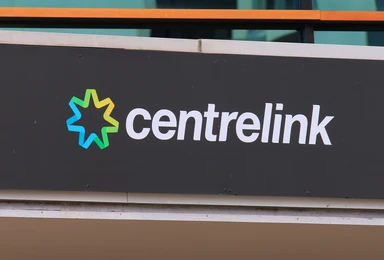Australian Couple Slammed for Living on Centrelink Payments
By
- Replies 47
For many people living off a fixed income, the rising cost of living can be an almost impossible challenge to overcome.
Many are trying to stretch their budgets in ways they never imagined, whether it be finding discounts on everyday items or cutting down on life's little luxuries.
For those who receive Centrelink benefits, the pressure to manage household finances can be even more daunting.
So, when an Australian couple recently detailed their life on Centrelink payments on ABC’s 7:30 program, anger echoed throughout the country.
Jennifer Searson and Mark Goodrick, currently living in Queensland's Sunshine Coast with their 15-year-old daughter, have experienced relentless criticism following their shared accounts of financial struggles while living primarily off Centrelink benefits.
Ms Searson is a lab technician who holds certifications in education support and business administration. She receives a carer's payment for her daughter, who has autism.
Their daughter's carer payment, according to Services Australia, amounts to a maximum basic rate of $971.50 every two weeks.
Meanwhile, Mr Goodrick, a qualified chef, works casually at a service station and earns approximately $1,300 a fortnight.
In addition to his casual work, he receives $250 from Centrelink, bringing his fortnightly salary to almost $1,600.
He admitted he prefers to work casually so he can collect Centrelink payments, sparking the fury of many who saw the couple's story.
However, the couple insists they have viable reasons for their financial choices. They claim that they are underemployed, not by choice but as a result of age discrimination and unsuccessful job hunts.

'We are poor, and we are on low income,' Mr Goodrick shared.
Meanwhile, Ms Searson said: 'There has been a proliferation of calling people on income support payments, particularly JobSeeker, dole bludgers.’
'Anyone can end up in this situation.'
Despite their plight, some viewers of their segment on ABC's 7:30 program took issue with the couple's choices, pointing out that they own two cars, their daughter appears to attend a private school, they spend around $350 a week on groceries, and they seem to have no plans to find full-time work.
One viewer wrote: 'These people are not doing it nearly as tough as many people I know. Sure, they're battlers, but many single-parent families exist, so in times of financial challenge such as this, the father could opt for the temporary sacrifice of full-time work with a long commute.’
'I saw this and I thought this family seem to be doing ok actually. Is this what welfare looks like?' another questioned.
A third chimed in: ‘There are plenty of people on JobSeeker who are in terribly desperate situations, bordering on poverty, that you could have featured in this story… This family is not in that situation. Perplexing as to why you chose them.’
'This is not genuine need. This is two people of working age making a decision to limit how much they work and seeking taxpayer funds to supplement their lifestyle choices,’ another added.
‘You don't get to refuse to work full time just because you get the difference from the public purse.’
ABC has yet to comment on the backlash.
Last year, in an opinion piece for The Guardian, the couple expressed that ‘survival is a daily challenge’.
They shared their concern that their child may be affected by the poverty they have experienced and the mentality that comes with it.
The couple went on to describe the difficulty they faced in trying to find affordable produce and bread for their daughter's school lunches.
The constant pressure of making these essential survival decisions took a toll on their mental health, making it hard to focus on job applications or present themselves positively to potential employers.
The couple also noted that they couldn't afford dental check-ups, and their physical health suffered as a result.
They refuted the idea that living on JobSeeker was a ‘lifestyle choice’ and emphasised that it only takes one unexpected circumstance to end up in their situation.

The couple's story sheds light on the harsh realities of living on a low income and facing constant financial struggles.
It's important to acknowledge that many households are facing similar challenges and might be silently battling to make ends meet.
While there may be differing opinions on how to manage finances, it's crucial to remember that there are government benefits available to help those in need.
If you're experiencing financial hardship, reach out and seek support.
Remember, you're not alone in this and it's important to regularly review your budget to ensure you're making the most of your entitlements and cutting unnecessary expenses wherever possible.
Have you or anyone you know ever had to struggle with a fixed income? Tell us about it in the comments below.
Many are trying to stretch their budgets in ways they never imagined, whether it be finding discounts on everyday items or cutting down on life's little luxuries.
For those who receive Centrelink benefits, the pressure to manage household finances can be even more daunting.
So, when an Australian couple recently detailed their life on Centrelink payments on ABC’s 7:30 program, anger echoed throughout the country.
Jennifer Searson and Mark Goodrick, currently living in Queensland's Sunshine Coast with their 15-year-old daughter, have experienced relentless criticism following their shared accounts of financial struggles while living primarily off Centrelink benefits.
Ms Searson is a lab technician who holds certifications in education support and business administration. She receives a carer's payment for her daughter, who has autism.
Their daughter's carer payment, according to Services Australia, amounts to a maximum basic rate of $971.50 every two weeks.
Meanwhile, Mr Goodrick, a qualified chef, works casually at a service station and earns approximately $1,300 a fortnight.
In addition to his casual work, he receives $250 from Centrelink, bringing his fortnightly salary to almost $1,600.
He admitted he prefers to work casually so he can collect Centrelink payments, sparking the fury of many who saw the couple's story.
However, the couple insists they have viable reasons for their financial choices. They claim that they are underemployed, not by choice but as a result of age discrimination and unsuccessful job hunts.

Backlash ensues as a Queensland couple with an autistic daughter discusses Centrelink living on ABC's 7.30 program. Credit: Shutterstock.
'We are poor, and we are on low income,' Mr Goodrick shared.
Meanwhile, Ms Searson said: 'There has been a proliferation of calling people on income support payments, particularly JobSeeker, dole bludgers.’
'Anyone can end up in this situation.'
Despite their plight, some viewers of their segment on ABC's 7:30 program took issue with the couple's choices, pointing out that they own two cars, their daughter appears to attend a private school, they spend around $350 a week on groceries, and they seem to have no plans to find full-time work.
One viewer wrote: 'These people are not doing it nearly as tough as many people I know. Sure, they're battlers, but many single-parent families exist, so in times of financial challenge such as this, the father could opt for the temporary sacrifice of full-time work with a long commute.’
'I saw this and I thought this family seem to be doing ok actually. Is this what welfare looks like?' another questioned.
A third chimed in: ‘There are plenty of people on JobSeeker who are in terribly desperate situations, bordering on poverty, that you could have featured in this story… This family is not in that situation. Perplexing as to why you chose them.’
'This is not genuine need. This is two people of working age making a decision to limit how much they work and seeking taxpayer funds to supplement their lifestyle choices,’ another added.
‘You don't get to refuse to work full time just because you get the difference from the public purse.’
ABC has yet to comment on the backlash.
Last year, in an opinion piece for The Guardian, the couple expressed that ‘survival is a daily challenge’.
They shared their concern that their child may be affected by the poverty they have experienced and the mentality that comes with it.
The couple went on to describe the difficulty they faced in trying to find affordable produce and bread for their daughter's school lunches.
The constant pressure of making these essential survival decisions took a toll on their mental health, making it hard to focus on job applications or present themselves positively to potential employers.
The couple also noted that they couldn't afford dental check-ups, and their physical health suffered as a result.
They refuted the idea that living on JobSeeker was a ‘lifestyle choice’ and emphasised that it only takes one unexpected circumstance to end up in their situation.
Key Takeaways
- A couple receiving welfare payments while raising a daughter has faced criticism for detailing their struggles to stay afloat despite not working full-time in five years.
- Many viewers took issue with the couple taking taxpayers' money when they have two cars, their daughter appears to attend a private school, and they spend about $350 a week on groceries.
- The couple argued that income support payments should be increased for Australians.
- The couple claims their age and their daughter's autism are factors in their difficulty finding full-time work.
The couple's story sheds light on the harsh realities of living on a low income and facing constant financial struggles.
It's important to acknowledge that many households are facing similar challenges and might be silently battling to make ends meet.
While there may be differing opinions on how to manage finances, it's crucial to remember that there are government benefits available to help those in need.
If you're experiencing financial hardship, reach out and seek support.
Remember, you're not alone in this and it's important to regularly review your budget to ensure you're making the most of your entitlements and cutting unnecessary expenses wherever possible.
Have you or anyone you know ever had to struggle with a fixed income? Tell us about it in the comments below.







